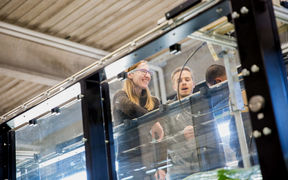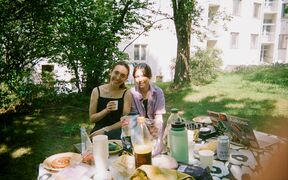Water and Environmental Engineering, Master of Science (Technology)

Degree:
Application period:
Language of instruction:
Duration:
Eligibility:
Field of study:
Credits:
Organising school:
Tuition fees:
Description
Ensuring sustainable use of natural resources under changing climate is our planet’s biggest challenge. Water resources management plays a critical role in guaranteeing food security and is closely linked to land use changes, nutrient flows, and biodiversity conservation. Further, climate change is expected to bring more extreme droughts and floods – both to which societies need to adapt.
Creating functional and sustainable water supply networks is among the most vital tasks in our society. The goal is not only to guarantee clean water supply and to protect the environment from the load of wastewater at all times, but also to reduce the environmental impact through a circular economy recovering nutrients and energy.
In the Water and Environmental Engineering (WAT) Master’s Programme, the focus is on water and water engineering solutions. Students learn the knowledge and skills to provide solutions to modern water-related challenges. The programme has a unique international focus and it combines a strong technical basis with a sound understanding of broader societal contexts.
Upon graduation, you are able to:
- Recognise and analyse the main components of sustainable water-related planning, implementation, and management processes.
- Understand the principles of the hydrological cycle and movements of water in natural and built environments.
- Apply key computational methods as well as relevant experimental methods and data analysis approaches related to water and environmental engineering.
- Design and develop urban water and wastewater systems to support sustainability and circular economy.
- Identify the societal context relevant to water and the environment, and comprehend the different scales and key drivers applicable to water and environmental engineering.
Language of instruction
In this master’s programme, the language of instruction is English.
More information and guidelines on the languages of the degree and instruction available in the university's website here.
Tuition fees and scholarships
The tuition fee for this programme is 17 000 euros per academic year. Citizens of European Union (EU), the European Economic Area (EEA) or Switzerland do not pay tuition fees. Citizens of other countries must pay tuition fees.
Aalto University offers a small number of scholarships in the form of tuition fee waivers to fee-paying students. Scholarships can be awarded to the highest-achieving applicants based on the programme's evaluation criteria. Applicants are ranked according to the criteria outlined on the programme's webpage.
More information on tuition fees and scholarships at Aalto University is available at the Scholarships and Tuition Fees webpage.
Structure of studies
Water and Environmental Engineering Master’s Programme consists of 120 credits (ECTS):
- Major studies (60 ECTS)
- Elective studies (30 ECTS)
- Master’s thesis (30 ECTS)
Students are able to complete their common and advanced studies during the first year. This leaves your second year for elective courses and the Master's thesis. You can choose practically any combination of elective courses – from Aalto as well as other universities in Finland and abroad – that supports your studies and suits your interests, including courses focusing specifically on environmental engineering. This study structure also makes it easy for you to go on a student exchange during the second year.
Our teaching combines theory with practice, including hands-on modelling work, case studies, group works, and projects. Many of our courses also collaborate with the industry and other stakeholders in the form of project works, mentoring and guest lectures.
More information about the programme content and curriculum can be found in the Student guide.
Webinar | Water and Environmental Engineering
Want to hear more about the Master's Programme in Water and Environmental Engineering? In this webinar the programme representatives will introduce the programme and answer your questions regarding the studies in the programme.

Specialisations
In this programme, students can tailor their studies to best suit their interests and aspirations. There are three study paths that complement each other through their own thematic and methodological focuses. The study paths enable you to build your own expert profile, and you will take courses from at least two different study paths: this also helps you to gain a broad understanding of our field. The study paths are:
1. Water Resources Management and Environmental Hydraulics
In this path, the focus is on varying topics related to water resources management, hydrology and environmental hydraulics:
- Surface water, groundwater, and runoff management
- Urban water and stromwater management
- Sustainable use of water in cities, agriculture, and forests
- Ecohydraulics, computational hydrology, and hydraulics applications
- Measurement of changes in water and the water environment caused by anthropogenic activities
2. Water and Wastewater Engineering
This study path deals with the water services that are crucial for society – these services need to function every day and under all circumstances. Sustainable water services protect human health and the environment. They are the premise for development. The main topics include:
- Clean water production and sanitation
- Environmental protection through wastewater treatment processes
- Circular economy as well as resource recovery from wastewater and sludge
- Climate impact mitigation in water services
- Modelling and optimization of water treatment processes and water service systems
3. Water and Development
Water is at the core of sustainable development at both local and global scale. This study path considers the diverse linkages between water and development across scales, and students learn about, among other things:
- Global water challenges with a multidisciplinary problem-solving approach
- The impact of climate change on water
- Use of water and other key natural resources in food production
- Water governance and water resources management, including transboundary water cooperation
- Sustainability and sustainable global technologies
Internationalisation
Many of the courses in this programme have an international focus. One of them (SGT Studio) offers you a possibility to carry out an international student project in different parts of the world as a part of multidisciplinary student team. Recent SGT project locations have included, e.g., Mexico, Uganda, Kenya, Tanzania, and Nepal.
The WAT Master’s Programme collaborates with various international universities, and students have the chance to complete part of their degrees abroad as exchange students. The programme also cooperates with Aalto Global Impact that facilitates global sustainability projects in collaboration with research teams and Master’s programmes. Many of the research topics at the Department of Built Environment are global.
Overall, Aalto University is known for its international study and research environment. Every year, Aalto welcomes thousands of degree and exchange students from abroad. Additionally, many of our professors and researchers have international backgrounds and experience, bringing their networks close to students.
Further study opportunities
The WAT Master’s Programme is considered a great foundation for doctoral studies. At Aalto, doctoral education is actively being developed by the Water and Environmental Engineering research group through experiences gained from the Majakka project. The research group provides doctoral students with an inspiring research environment to carry out their studies.
Read more about applying for doctoral studies at Aalto University:
https://www.aalto.fi/en/doctoral-education/how-to-apply-for-doctoral-studies
Career opportunities
Water and environmental engineering provides you with diverse career opportunities. There is a consistent demand for experts in this field with good advancement opportunities during their careers. While most of our graduates work in Finland, our Master's programme prepares you also for an international career for example within the United Nation system.
Our graduates typically work in the fields of water resources management and water engineering as planners, technical experts, and managers. They have varying tasks related to, for instance, water supply planning as well as environmental and flood risk management. The typical employers include consulting firms, regional environmental centers, cities and municipalities, research institutes such as Finnish Environment Institute Syke, equipment and process suppliers as well as water utilities. Part of our graduates continue to our doctoral studies.
For more information about this field’s career prospects, please visit Aalto Career Design Lab.
Research focus
The main research themes of the Water and Environmental Engineering Research Group are the same as the study paths of WAT Master’s Programme: Water Resources Management and Environmental Hydraulics, Water and Wastewater Engineering as well as Water and Development. You can find more information about these research topics here.
Co-operation with other parties
Water and Environmental Engineering Master's Programme collaborates closely with the industry, engaging both public and private sector actors in education. This means guest lectures and joint projects that provide you with a view on and connections to the working life. In addition, the programme cooperates with other programmes at Aalto.
Get to know us
Student Aino Ahvo works with the Baltic Sea pollution
Aino Ahvo considers that her master’s programme gives tools that can help to solve the Baltic Sea pollution problems.

Maria Kosonen chose to study Water and Environmental Engineering as she was interested in environmental issues
During her studies Maria Kosonen has got international experiences from Australia and Kenya, and soon also from Spain.

Student Artem Makarov found his dream job in industrial water treatment
Artem Makarov, who is originally from Russia, is now finalizing his studies and working full-time simultaneously.

Water and Environmental Engineering
Water and Environmental Engineering research at Aalto University aims to find solutions to decrease resource scarcity and to support sustainability. Our research is divided into two strategic areas: global water issues and sustainable circular economy, which are further divided into four research entities.

Chat with Aalto students
Curious about life at Aalto University? Chat with Aalto students and join them for virtual Coffee sessions every Friday!

Evaluation criteria for the programme 2026
Applicants to the programme must meet the general eligibility and language requirements that are common to all Master's programmes in Aalto University. Applicants meeting Aalto’s general eligibility criteria for master's studies are evaluated and ranked according to the evaluation criteria decided in advance for each study option.
The applications to Master's Programme in Water and Environmental Engineering are evaluated based on the following criteria:
| What is evaluated? | Grades of the previous degree(s) |
| What we look for in an applicant? | Grades need to be mainly very good or excellent. The applicants' success in their previous studies (those that give basis for applying to the programme) will be evaluated based on the cumulative grade point average (CGPA). |
| Method of demonstrating competence | Transcript(s) of records, degree certificate(s), grading scale |
| What is evaluated? | Recognition and quality of applicants' previous institution(s) |
| What we look for in an applicant? | The applicants' previous institution (where the degree giving basis to apply was completed) will be evaluated based on the recognition and quality of the institution |
| Method of demonstrating competence | International and national rankings of the higher education institutions |
| What is evaluated? | The relevance of contents and scope of previous studies to Water and Environmental Engineering Master's Programme |
| What we look for in an applicant? | Bachelor's degree or equivalent degree in a relevant field, with the course contents suiting very well to Water and Environmental Engineering Master's Programme. In addition to the studies giving basis to apply to the programme, other possible studies are also evaluated. Given the broad scope of our Master's Programme, relevant degrees can come from fields such as water engineering, environmental engineering, civil engineering, environmental sciences, natural resources management or other fields providing meaningful foundation for this Master's Programme. Due to our focus on engineering skills, all applicants should possess at least some level of expertise of mathematics and computational methods as well. |
| Method of demonstrating competence | Transcript(s) of records, degree certificate(s) |
| What is evaluated? | Applicants' further applicability to the study option as well as motivation and commitment for studies. Also work experience as well as other acquired knowledge and achievements (e.g. publications, non-formal education, competitions and possible already existing Master's degrees) are evaluated based on documents submitted (incl. Motivation letter and CV) |
| What we look for in an applicant? | The applicants should be motivated to study the chosen subject and committed to full-time studies with a plan to complete the Master's degree in two years. We are looking for applicants who are able to express clearly the reasons for applying to the study option and describe why they would be good candidates for this study option. Language skills (incl. Finnish and Swedish) are also considered as part of this criteria. Motivation letter is a mandatory document. Please see further instructions for the motivation letter below. In addition to the studies giving basis to apply to the programme, other possible studies are also evaluated. However, the study option should provide genuinely new knowledge and enhance the career prospects of the applicants. Thus, applicants who already have a master's degree in a closely related field will only be admitted with well-justified reasons which should be explained in the motivation letter. |
| Method of demonstrating competence | Motivation letter |
Evaluation process and requested documents
Applicants' evaluation process is described under Evaluation process. In addition to obligatory application documents, this study option asks the applicants to submit also the documents listed under Requested documents.
The applicants are first evaluated based on Aalto University eligibility requirements. Applicants meeting the general eligibility criteria for master's studies are evaluated and ranked according to the evaluation criteria that are decided in advance for each study option.
The selection process for those who meet the general eligibility criteria is described next. The applications are evaluated based on the following criteria:
- Academic performance
- Recognition and quality of institution
- Relevance of previous studies
- Suitability
After evaluation of the criteria, the best applicants will be selected based on the joint evaluation of all the criteria.
The lack of these documents will adversely affect the evaluation of the application.
1) MOTIVATION LETTER - mandatory document
- Max 1 page
- Should be written in English
- Please structure your motivation letter according to the three themes indicated below and make sure to provide answers to the related questions:
Expectations towards to this master's programme
- Why are you applying for the master’s programme in Water and Environmental Engineering WAT?
- What do you expect to gain from studies in WAT master’s programme?
- Why do you want to study at Aalto University and in Finland? What kind of linkages you already have to Aalto and/or to Finland?
Your competence & motivation
- Why do you think you are the right person for WAT master's programme?
- How will your previous education, work experience, knowledge and skills support your success in your master’s degree studies?
Future plans
- Describe your professional goals. How do you think WAT master’s programme would support the development of your professional profile?
- In which sector would you like to work in the future? What kind of career are you planning? Where do you want to work in the future?
PLEASE NOTE: In case you already have completed another master’s degree or doctoral degree or if you have a study right to another master’s or doctoral programme, you are asked to explain why you are applying to complete another master's degree and how this would complement your competence.
2) CURRICULUM VITAE - mandatory document
- max 2 pages, written in English
- Must include all your academic degrees, relevant work experience and language skills (including Finnish and Swedish).
- Also indicate other possible relevant merits such as publications, other experience and non-formal learning.
- NOTE: kindly list all relevant courses you have completed related to mathematics and computational methods, including their name, extent in ECTS as well as a grade.
- You are also strongly engouraged to include links to the websites that demonstrate your competence (e.g. LinkedIn, personal portfolio)
3) GRADING SCALE
The applicant must provide information on the official grading scale used in the Bachelor's degree studies, including the lowest passing mark on the scale. The grading scale may be included in the transcript of records/degree certificate or it may be provided as a separate document, such as a link to the grading scale on the institution's webpage or handbook, a diploma supplement, or another reliable source. Applicants from Finnish Universities or Universities of Applied Sciences do not need to submit this document.

Contact information
Minna Marin
Planning officer (content and studies of the programme)
masterstudies-eng@aalto.fi
Aalto University, Admission Services
For enquiries regarding the application process, obligatory application documents or English language proficiency, please contact Admission Services at
admissions@aalto.fi






